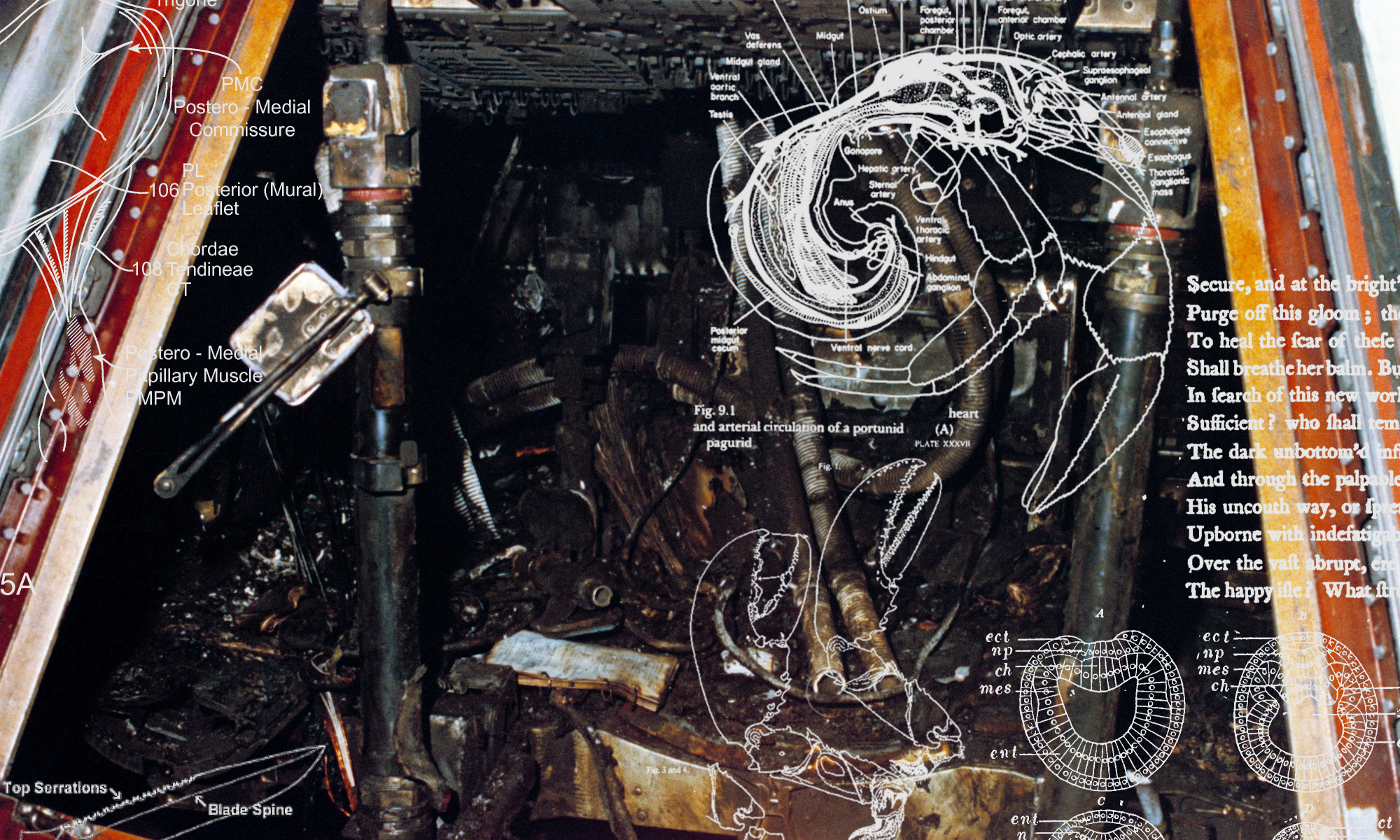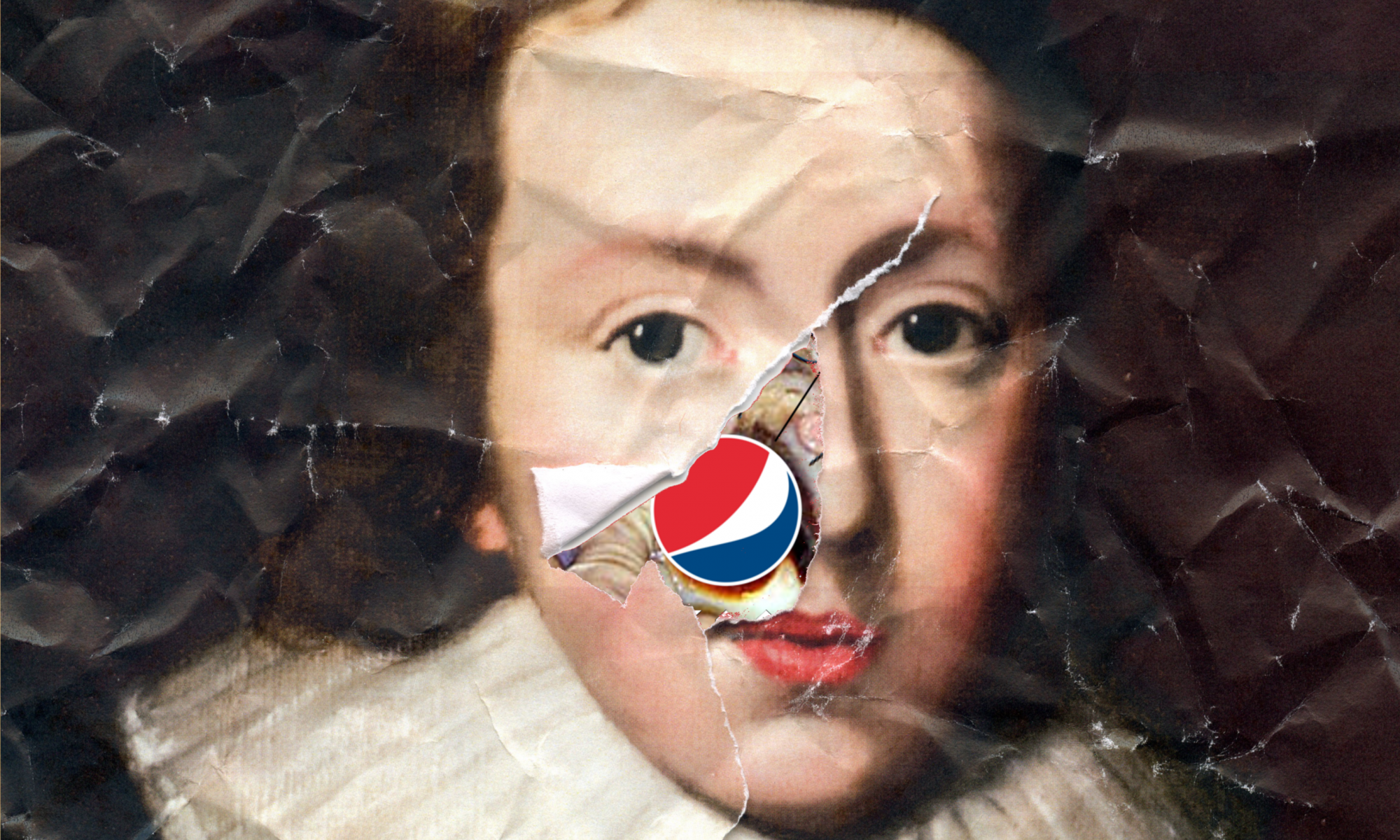by pps
“The fully enlightened earth radiates PEPSI triumphant.”
—Source unknown
“The Pepsi ethos has evolved over time. The vocabulary of truth and simplicity is a reoccurring phenomena in the brand’s history. It communicates the brand in a timeless manner and with an expression of clarity. Pepsi BREATHTAKING builds on this knowledge. True innovation always begins by investigating the historic path. Going back-to-the-roots moves the brand forward as it changes the trajectory of the future.”
—Arnell Group, Breathtaking, Design Document, 2008[note]https://www.goldennumber.net/wp-content/uploads/pepsi-arnell-021109.pdf[/note]
“Some years ago, on a stormy night in New Haven, I sat down to reread [Paradise Lost] … And while I read, until I fell asleep in the middle of the night, the poem’s initial familiarity began to dissolve … Although the poem is a biblical epic, in classical form, the peculiar impression it gave me was what I generally ascribe to literary fantasy of science fiction, not to heroic epic. Weirdness was its overwhelming effect.”
—Harold Bloom[note]The Western Canon, (2004).[/note]
“Yet he who reigns within himself, and rules
Passions, desires, and fears, is more a king;
Which every wise and virtuous man attains:
And who attains not, […]
Subject himself to anarchy within”
—Milton, Paradise Regained, ii.457-62
DAY 1. THE PEPSOIDAL FALL: Pepsi & Teleoplexy
Early in November 2017, fisher Karissa Lindstrand dredged up a lobster off the coast of New Brunswick, Canada. The crustacean had a Pepsi logo prominently tattooed onto its propodus, or claw. Precisely how this logo came to be there remains a mystery: when the event made the news, marine biologists instantly disagreed as to the provenance and occasion of the marking. The mechanisms of imprinting are largely irrelevant, for we instead read this event in a deeper, properly world-historical light: this decapod pincer represents a mere moment in a far vaster process, one spiralling outwards in both time and space… The following (an essay split into 7 sequential parts) is, in many ways, an attempt to fill in this story, as it provides context to the unnerving singularity of recent events such as a sigil-branded lobster from the deep.

“The four rivers of Eden were milk, water, wine and ale”, wrote G.K. Chesterton, “[a]erated waters only appeared after the Fall”.[note]G.K. Chesterton, A Gleaming Cohort: Being Selections from the Writings of G.K. Chesterton (Methuen, 1926), 6.[/note] Pepsi, in other words, is irrecusably Fallen. Fizzy drinks are beverages for a postlapsarian world. Why, however, does Chesterton choose soft drinks, of all things, to signify this? Because, putting it simply, Pepsi and its ilk operate perfectly as metonymy for capitalisation. Moloch’s sugar-infused reign and the biblical Fall are teleologically married. Put more strongly, Capitalisation and the Fall are identical. Why? Because — as shall soon be made clear — capitalism, just like the Fall, functions according to a logic of predestination. Via mereological usurpation, soft drink comes to stand as synecdochic totem for global capitalisation itself, and, as such, Chesteron’s aphorism can be retrochronically grasped as masterfully encrypting vast and panoramic truths, ventriloquized by the tractor of powerful world-historical forces. Why should this be the case? Because the very fact that Pepsi works so adeptly as a synecdoche for capital alerts us to the infernal — and thus fall-generating — essence of capitalisation itself. Synecdoche — at its most basic — is an acute destabilisation between Part and Whole, and thus also between Means and Ends.[note]Mereologically speaking, parts are subordinate because they are means towards the upkeep of the whole, which is therefore the end.[/note] It accordingly represents a co-option of Ends (the Whole) by what was once merely a Means (or, Parts). Synecdoche subverts the direction of the hierarchical relationship whereby parts serve as mereological means towards the whole-as-end. Thus: synecdoche is a metastasising of Part into its own tumorous Whole (which, therefore, comes to threaten the integrity of the parent Whole). Such synecdochal operation is essential to the nature of capital itself, whereby means (here the utile quenching of thirst) mutate into ends-in-themselves (global Pepsi-production, Pepsico domination), via a positive-feedback process of rigorous self-selection (Pepsi wants itself). The restricted economy of hydration haemorrhages into a generalised economy of interminable fizz, and, through an inflammation of supernormal stimuli (exaggerated sugar content tending to fixation and addiction amongst abstract Pepsi’s host-organism), soft drinks come to progressively shed the functional camouflage of thirst-quenchers and medicinals that guide them — trojan-like — into the world.
In 1904 (just a year after Pepsi-Cola was trademarked), Gillespie’s Natural History of Digestion had already pinpointed this inclination: the “[s]timulation of the appetite with highly-flavoured foods diminishes the natural [relation between food and sustenance or means and ends]”, tending instead “towards living to eat instead of eating to live”.[note]Alexander Lockhart Gillespie, The Natural History of Digestion (W. Scott, 1904), iii.[/note] It is capital’s very inherent nature to perform this part-whole destabilisation: this is why Chesterton’s Pepsi-synecdoche so perfectly encapsulates capital even as it occludes capital-as-such behind a subsidiary part, set behind subset (indeed, to stress the point, it captures it perfectly not in spite of this occlusion, but because of it). Thus, we see how the means-ends subversion inherent to capital is inherently infernal, in a very specific sense of the term. Synecdoche represents a mereological revolt, just like the original Satanic revolt (wherein a subset — i.e. the rebellious angels — metastasises to challenge the whole — i.e. empyrean rule). It is the hypertrophy of a part into its own pseudo-whole, causing a resultant antagonism between ‘satanic tumour’ and ‘divine host’: when the immanent (the lower and derivative), by coming to cause itself (Satan’s feigning of freedom), begins to simulate or feign its own transcendence (sovereign autonomy), therefore coming to compete with (and potentially usurp) its own ‘ground’ of production. It is, at heart, a self-causing reversal of metaphysical hierarchies. Demonic revolt is ontological cancer, malignant synecdoche. God’s divine rule, or human social relations, are effectively usurped by the cancerous pseudo-ends of a catalytic part: demonic insurrection, or, sugar-bent carbonation. Synecdoche, as breakdown of the unidirectionality of strict top-down rule,[note]It is mereological disruption: collapse of the hierarchical (and metaphysically suspect) distinction between Whole and Part or Ends and Means, folding them into feedback as opposed to supremacy. In this way, Satan — and the Fall triggered by this — can be understood as cybernetic events.[/note] is thus an alluring model for cybernetic runaway. Capitalism’s own logic is hence one of synecdochal usurpation. In this sense, all Capitalism tends towards Pepsi-Capitalism: as it progresses simply as the replacement of top-down goals by hyertrophying sub-routines; and this is why it is an inherently inhuman — thus infernal and demonic — project. God’s encephalic executive function swarmed by cerebellum supestimuli.

But the connection between Pepsi, Capitalisation, and the Fall runs even deeper. This usurpation tends towards auto-production: it can be understood as the process whereby a means becomes an end-in-itself. This is triggered when a part comes to cause itself (thus, satanically breaking away from its dependence on the original whole); which is, in turn, identical to pointing out that it progressively comes to predestine itself, via its own auto-installation of a logic of circular causality. Part-whole subversion is the same as predestination. In the sense that Pepsi is Fallen it is also therefore predestined. Following from Reformed Orthodoxy’s doctrine of ‘supralapsarianism’, the Fall — and all its causal derivatives and ramifications — became cast as an intra-temporal event that nevertheless entails itself from outside of time (something within time that comes to structure time itself from without).[note]The Reformation staged a conflict between so-called ‘infralapsarian’ and ‘supralapsarian’ conceptions of Predestination. Election and Reprobation either arises from within time (infralasparian), or it structures time from without (supralapsarian); either creation logically entails predestination, or predestination entails creation. Unappeased with this binary, one seeks to diagonalise the decision: thus, we believe that the Fall is both ‘infra–’ and ‘supra–’ temporal. In other words, the distinction between the two doctrines becomes one of complex feedback — rather than contradistinction or mutual exclusion — as we come to realise that the ultimate extra-temporal ‘End’ constructs itself from within time, via memetic and cybernetic vectors, before subsequently dragging eventualities towards its own completion. This is identical with the pars-pro-toto revolt constitutive of the term ‘Pepsi-capital’. Moreover, it is the fear of such auto-production that — as we shall see in the following — John Milton was so prophetically attuned to.[/note] Capitalism, likewise, represents a similar kind of self-installing predestination: as a real teleology (a self-intensifying process that accordingly reifies its own ‘destiny’ as a real causal force), one that relentlessly exceeds the top-down, central planning of divinity via its tendency towards demonic synecdoche. This headless teleonomy echoes, therefore, the Fall considered as an event that is predestined with precision but arises — for torturous, even schizoid, ethical reasons — orthogonally to God’s putative ‘goodness’. In Chesterton’s gnomic phrase, Pepsi and the Fall thus become entangled in a mutually-enforcing prophetic structure: whether he knew it or not, he was invoking the fact that both are forces of destiny and thus also agents of temporal distortion. To explicate: Pepsi operates so well as a metynomic placeholder for capital because — just like the Fall — it becomes its own effect and its own cause.[note]On the view of reformed theology, the Fall causes itself within time because it was determined from the end of time.[/note] It causes itself in a bootstrapping process that is revealed as an effect of the future on its own past: retrochronic projection, or temporal anomaly. Again, like the Fall, it is an event within linear time that is caused (or comes to cause itself) from without. Along with the Fall and Calvinist double predestination, Pepsi becomes its own telic destiny, by progressively installing the means of its own propagation. Auto-production is indistinguishable from predestination which, in turn, is indistinguishable from temporal non-linearity.
Interfacing with the CNS from the future, abstract Pepsi causes present addiction: the bio-physiological translation of predestinal logic. Condemning us to desire by making us desire further condemning. It becomes real-world prophecy, or atheological predestination: Pepsi-capital inundates the world with a marketing-deluge of Noachic proportions, dragging itself towards the installation of an end-oriented logic of aggressive self-propagation. Lock-in ensues as PepsiCo constructs its own pathway towards its own future and Supernormal Stimuli Take Over. Like a satanic cuckoo, Pepsi-production co-opts the better angels of our nature, flooding normative and decisional structures — even evolutionary purposiveness — with effervescing blackness. In other words, the belly overthrows the head (as we shall see, another perfect model for demon revolt). Thus, the metynomic role the “aerated waters” play in Chesterton’s invocation (as symbolic interface between Capitalisation and Fall), comes to communicate the structure of an intestinal revolt that also captures the workings of auto-productive predestination. Chesterton’s metonym rhetorically encapsulates the essentially acephalic and auto-productive nature of Capital; and, insofar as Capital is auto-productive, it consists in a temporal anomaly (because it comes to cause itself). In other words, it seeds telic forces and becomes its own destiny, just like the Fall (as envisioned post-Reformation). It is an event within time that nevertheless comes to organize the structure of time itself. And so: both the Fall and Capital, through their worldly manifestation in Pepsi Cola, consist in a form of temporal interference. By announcing that Pepsi is Fallen, therefore, one acknowledges, accordingly, that Pepsi invents itself from the future.
When observed from the perspective of synecdochal usurpation and the attendant circular causality of self-selecting replication, Pepsi is installed as the true Subject of World History. It becomes the immanent end towards which history tends. Certainly, teloi do not have to be transcendent or sanctioned by divine decree; teloi can install themselves (via a dynamic of self-selection and lock-in).[note]This is also how intratemporal events can come to shape the extratemporal arrow of time.[/note] Satanic revolt is the extension of competition to teloi or transcendences: it is when ‘the Lower’ comes, via its own resources, to mimic or dissimulate its own form of ‘the Higher’; and, since mimicries can become as good as the prototype, or, alternately, simulacra make themselves real, this mimicry eventually comes to directly compete with the original transcendence. Once various options exist, competition sets to work. Facsimile competes with and potentially usurps prototype: this process applies to deities as much as cuckoo hosts. Satan denotes a parasite transcendence. Demon revolt thus flags the story of how transcendences can be manufactured immanently, and the subsequent problems this holds for the prototype. Pepsi’s auto-production, therefore, is ‘satanic’ exactly because it represents this same threat with regards to the comparative ‘divinity’ of human goals, norms, and ends (infernal cola vs anthropological central-planning; intestine vs encephalon). Thus, as Pepsi falls together from the future the occult signs of this temporal interference (self-assembly) are registered as symbolic resonances within the domain of world-historical figures and works — by those particularly sensitive to the cross-currents of temporal complexity. Insofar as the Reformation re-invented soteriology it also re-invented time; insofar as it re-invented time it also (famously) unleashed market capitalism and, thereby, also untold teleonomies. It should be no surprise, then, that the signs of templex autopepsia are strewn throughout the works of that greatest poet of Reformed Christianity, John Milton.[note]MILTON = 137 = LUCIFER[/note] Just as the pious Calvinist detects signs of extra-temporal reprobation in her intra-temporal “works” (i.e. deeds and actions), the signs of self-assembling and end-orientated Pepsi are littered throughout Milton’s magnum opus, Paradise Lost. When considered from the standpoint of modernity and capital’s nonlinear temporality, the poet’s premonitions of Pepsi-Chaos can be considered as both causes of what happened afterwards (as upstream nodes of cultural influence that helped enforce Protestant capitalogenesis) and also as effects of what happened afterwards (as the retrochronic scars of predestinal attractors). These premonitional markers take the form of a complex knot of imagery that connects alchemy, digestion, and chaos theory to the occult historical origins of carbonated soft drinks.

Chesterton is correct to note that fizzy drinks could not have been found in the four rivers of Eden. As any sensible person knows, something cannot be discovered within the world before the world invents or produces it. Nevertheless, as long as intratemporal (intralapsarian) cola is ‘predetermined’ it is also therefore supratemporal (supralapsarian, or, arising from outside of linear time, and shaping it from without). In other words, even if Pepsi could not have existed in Eden, we may find it elsewhere — beyond sublunary domains. And so, in Book II of Paradise Lost, Milton describes the four rivers of extratemporal Hell:
Of four infernal rivers, that disgorge
Into the burning lake their baleful streams [PL: ii.575][note]Quotes from Paradise Lost, ed J. Carey (Longman, 2007). Henceforth abbreviated to ‘PL’, and with reference to Book Number (numerals) and Line Reference (number).[/note]
One of these streams, “Acheron”, the tartareous river, is witnessed as “black and deep” [PL: ii.578], suggestively redolent of the Pepsi Cola that would be invented only later (if such temporal deixis makes sense ‘outside’ of earthbound time) from “[a]erated waters” and “after the fall”. Tartareous, black, and deeply sugary, Pepsi’s world-historical auto-production (in particular, its alchemical historical genesis) undergirds Paradise Lost’s metaphysical schema. In the following, we will uncover these templex crosscurrents between Pepsi-Cola and Paradise Lost, to discover Pepsi, like Acheron, bubbling darkly beneath the verse: a cola Alph, flowing to a sunless sea. For, as we shall see, Milton’s poem is informed by a deep-set horror of auto-production, and he assigns a central — if repressed — role to the chaotic and excessive tartar of the universe: that which eternally revolts against divine-planning through a form of cosmic deregulation (or indigestion). This auto-productive element fuctions, as we have seen, not just as demonic insurrection but also, crucially, as a temporal one too. Indeed, demons are self-producing, like the zero that creates number from nothing (“My name is legion for we are many”), and thus they can persuasively be taxonomically classified as, in essence, agents of temporal distortion.[note]Think of the possessed demoniac whose splintering personality is multiplied by the malignant zero of the invading demon. “We are many”. Why is the demon here a ‘zero’? Because it is ontologically poor: it cannot exist without a host (much like numerical zero only comes into focus in relation to the number line), and is thus nothing outside of its possession of something else. It is thus a nothing, or cipher, that refracts a person into a schizoid many; and is similar to ex nihilo production (the hallmark, we stress, of chaos and infernality, and also of bootstrapping auto-production).[/note] Inasmuch as Milton’s epic is ‘about’ demonic auto-production it troubles the very notion of ‘aboutness’ itself: with a circumvoluting cyclicality whereby the poem only becomes ‘about’ what it is about — later on — after it has produced its own subject and summoned it forth into reality. (Milton’s tartareous auto-producing Chaos eventually ‘becomes true’ under the figure of end-oriented Pepsi Cola and, correlatively, Miltonic Chaos retroactively comes to be ‘about’ Pepsi.) It’s not ‘about’ anything that it doesn’t subsequently itself create. In simpler terms, because the poem concerns itself with auto-production it can be ‘about’ things that are entirely distal from it, in the causal, linear order of revealed history. As such, we pick up the interference patterns of temporal-looping through the fact that Milton’s figure for auto-production — Chaos — is itself deeply semantically entangled with the actual historical roots of Pepsi Cola. Here, again, cause and effect become reversible: Pepsi retrocausally interferes with the shape of Milton’s verse, just as Milton — prophet of Pepsi-chaos — instils a forecast that makes itself true in the form of this ultimate postlapsarian product. It is this looping that Chesterton picks up on. Pepsi and the Fall? They cause each other.

One pauses, and is suddenly struck with a vision: The Earth opens up and seeps fizzy pop. The carbonated fountains of the great deep break open. End-oriented teleoplexic history reveals that the world was created merely to spew forth Pepsi: everything else was merely a means to this end. They call it the 𝖕𝖊𝖕𝖘𝖎𝖈𝖑𝖎𝖕𝖕𝖊𝖗. Pepsi, as cosmic alchemical baseline or sugary-blackened-Nigredo, is the Alpha and the Omega, and all other conceivable ‘ends’ (human will, desire, values, Promethean ambitions) are merely camouflaged ‘means’ for the shooting forth of Pepsi from the great internal fountains of the Earth. The springs of terrestrial history weep black liquid sugar. Tears of Pepsi trickle from the empty eye-socket of an anorganic God, a cosmic visage pulled back into sugarrush rictus. This time there is no Noah and no ark. Everything drowns in obsidian sluice. Glucose high; glucose crash. John Milton — blind prophet, blind to his own prophecy — announces this, our fate, from Anno Domini 1667.

Tomorrow: ‘Day 2. Crystal Pepsi / Crystal Hyaline: or, How to See with your Gut’


